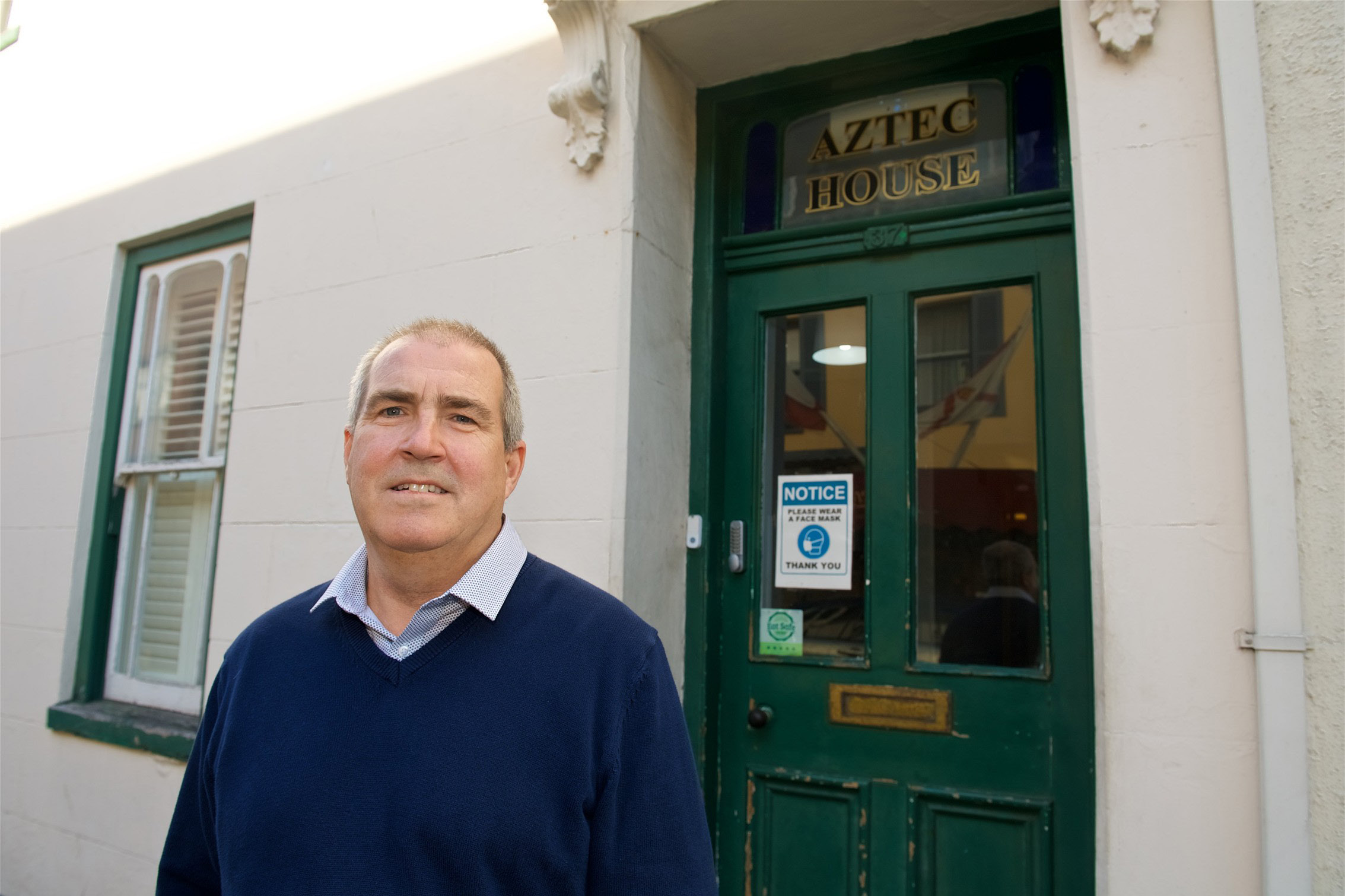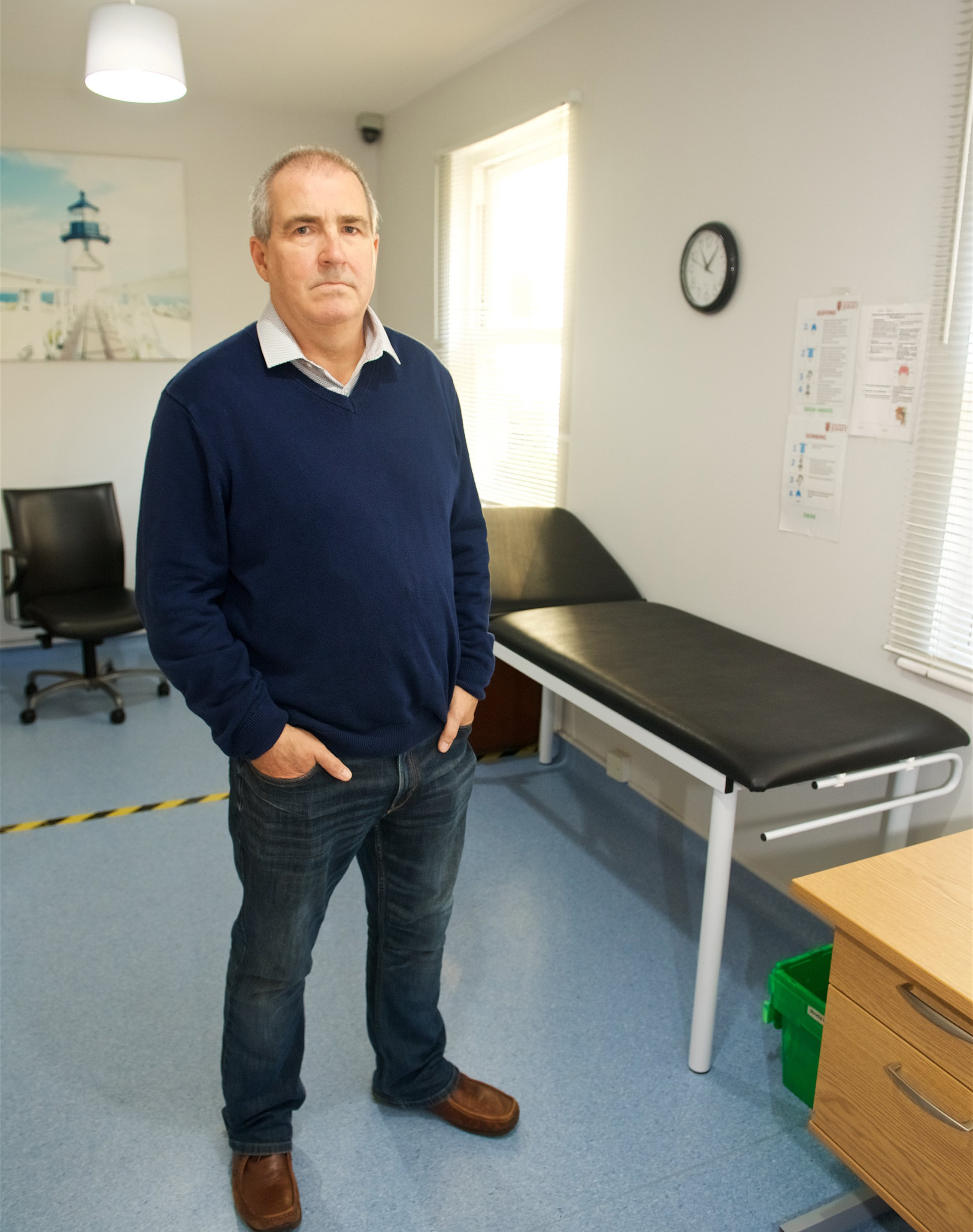
NEVILLE Benbow knows when it is not the right time to celebrate.
Although his organisation’s 30th anniversary is a significant one, its success suggests a worrying phenomenon inconsistent with a traditional party atmosphere. The Shelter Trust’s milestone, although marking the start of a fourth decade spent changing the lives of thousands in need, also highlights Jersey’s growing gulf between the haves and the have-nots.
When the charity began in the early 1990s from premises in Poonah Road, it provided accommodation for 20 people. Last night, Mr Benbow says, 101 of their 108 beds were in use. One in four clients has yet to reach their 25th birthday, while the increasing number of homeless women has provided the spur later this year to open a specialist facility that will accommodate 19 females and offer two family rooms. That will take the Trust’s total capacity to 130.
Over the past 12 months, the Shelter has housed more than 500 individuals, provided help and support to more than 700, served 90,000 meals and supplied 40,000 bed nights of accommodation.
These are statistics that the charity’s chairman of trustees, who joined the organisation nine years ago, pauses to reflect upon.
‘There is a perception that people who are homeless have brought it on themselves but I think this last year has been the starkest reminder that is not always the case and, in fact, it is very rarely the case,’ he said.
‘People don’t want their relationship to break down and people don’t want to lose their job. For people who do have a drug or alcohol dependency, there is usually a reason for it and there are trigger points.’
Nor do the majority of their clients conform to a stereotype today sadly associated with some of the park benches in Parade Gardens. ‘Actually, it’s very few of those people although there are always some but everybody has a different story and we treat everybody as an individual,’ Mr Benbow added.
In fact, the success of the Trust’s mission means that the problem of homelessness in Jersey is less obvious to most Islanders than it is elsewhere. Traditionally gauged by its public face – sleeping rough – those external signs are more readily associated with major UK cities: growing numbers in Jersey have instead come to the charity, which currently offers accommodation at six sites in St Helier and one just across the border with St Saviour.
The Shelter Trust was one of the organisations that benefitted last year from emergency funding channelled through the Jersey Funders’ Group to those organisations whose services came under extreme pressure as a result of the pandemic. To regular client groups were added seasonal workers arriving in the Island with the simple ambition of earning money to take home to their families at the end of their stay. They found that the ground had shifted beneath them.
‘Covid changed a lot of the dynamics because, in the very first week, 24 new people came to us and said: “I need help. I haven’t got a roof over my head.” These were a new type of homeless. A lot of them were newly arrived seasonal workers who had no job and therefore no accommodation, and they were also in the invidious position of not being able to leave the Island, so where did they go?’
Mr Benbow poses a rhetorical question in the true sense for their very presence at Aztec House, the charity’s emergency accommodation facility in Kensington Place, testified to the success of the service.
‘They were very surprised that they would be looked after in Jersey. We might ask some questions but we’ll ask the questions after they’ve been there a night. We make sure that they are safe for the night first,’ he said.
As it has done in so many walks of life, Covid made an immediate impact not simply on demand for services but also on what Mr Benbow calls ‘the dynamics’ of the operation. The unit’s capacity of 48 was immediately reduced to 35 to ensure single occupancy of rooms, consistent with distancing requirements, but, while that gave impetus to their aim to offer privacy to all clients, it compounded the challenge of rising numbers.
‘We moved 52 people out to hotels and bed-and-breakfasts with the support of the government, and we increased our sites to eight, such was our determination not to turn anyone away. We had to provide capacity so we did. When we were at 124 maximum, we were regularly at 122 and 123, and very occasionally at 126 because the reality is that we will always find a bed, even if it is a put-you-up bed for one or two days while you sort things out,’ he said.
By good fortune, with the support of the government, at the start of the pandemic, the charity was able to introduce its own onsite primary care clinic or GP surgery, a development previously in the planning but accelerated last year. It allowed everyone who was homeless during the pandemic to be health-checked and helped to contribute to very low rates of Covid infections at the Shelter. The unit’s drunk and incapable facility – one of only three or four in the British Isles which offers an alternative to the Court service – became an isolation wing.
Now, as the Shelter deals with what everyone hopes are the latter stages of the pandemic, its challenge is to understand where the pandemic has left demand for services. Numbers have fallen since that peak last year but not as far as Mr Benbow hoped, giving rise to speculation about the longer-term impact, as the consequences work their way through the Island’s economy.
‘Homelessness always lags behind recessions and Covid has effectively been another recession. Whether Jersey is or isn’t technically in a recession isn’t something I can comment on but Covid has created recession-like conditions. Every time there was a change in government policy, in terms of what support was no longer available, you’d then see an increase in the number of people who would be saying: “Look, I just can’t cope”.’
The state of the economy is just one of the factors that contribute to homelessness, along with relationship breakdowns, drug and alcohol dependency, mental-health problems and the challenges of rebuilding life following prison release.
Currently, the Shelter provides for a client group aged 17 to 83. Its diversity prompts Mr Benbow to offer a salutary reminder to those who still associate homelessness with circumstances comfortably removed from their daily lives.
‘They say everyone is just one step away from homelessness and I think Covid was a great example of how that is the case. If you lose your job and you can’t cope on the income you’ve got, your landlord may not be that forgiving and we had people who had simply lost their accommodation. They weren’t necessarily evicted but found themselves without somewhere to live.’
Central to the service which the Shelter offers – working with other agencies including the Jersey Homeless Outreach Group – is not only the offer of a bed for the night but also a pathway back to independent living, ‘an arms-around support package,’ as Mr Benbow describes it.
‘It is temporary accommodation. We don’t expect people to come and stay with us for a long period of time. We are a temporary solution. Our aim is to help people find mainstream accommodation, so that they can move on with their lives. Homelessness doesn’t mean hopelessness. Some people need a matter of days to get themselves back on their feet, others weeks, others years.
‘We ask two uncomfortable questions: Do you have a job and when are you leaving? Because we want people to move on. We’re more than just a roof over someone’s head: we are opening the door to a better future for them and we will always make sure that door is open,’ he said.
In these uncertain times, a worrying new trend is beginning to emerge: the gap between pay and rents is widening, and the shortage of accommodation is creating a new group of potential clients – those who may have a job but whose means is still insufficient to pay for accommodation.
Mr Benbow has noted an increase in numbers struggling to balance the domestic budget. ‘When a one-bedroom flat costs £300,000 to £330,000, how is that affordable for someone who is on a basic wage when our minimum wage in Jersey is lower now than in the UK?’ he asks.
The £130 weekly contribution to care which the Trust seeks, either direct from individuals in employment or from the Social Security Department, is far below a typical market rental that is becoming ‘near-on impossible’ for many on the minimum wage, Mr Benbow believes.
Later this year, when the new unit for women opens in St Helier, the Shelter Trust will employ 50 staff and the trustees will be faced with the challenge of raising £3 million a year towards the organisation’s running costs.
This will be a challenge for a charity which, Mr Benbow admits, does not address the wider medical-research needs of the whole community or make a more emotive appeal to the public. They are not sexy, he acknowledges, but could not do what they do without ‘the people of Jersey’ and organisations like the Island’s housing associations and Christians Together.
Through fundraising – like the flagship pre-Christmas soup kitchen in the Royal Square – and support from trusts and grant-giving organisations, the Shelter prides itself on responding to whatever circumstances arise. Mr Benbow says they will always respond to demand, even if that presents something of an unknown these days.
‘We’d like to see the numbers coming down but I can’t see it because the pressures are going to continue. What’s next? It could be a post-Covid recession. There is going to be something else coming down the track which is going to keep those pressures on. Jersey is quite a distinct have and have-not society because of the differentiation in pay across the sectors and especially for those where the minimum wage is the norm. That’s not great for the development of a society where everybody is well-placed.
‘But we find ways. We could change our occupancy and double-up in some rooms but we would always find accommodation. If you were homeless, the worst thing that could happen to you is if you were turned away from a homeless shelter.’
